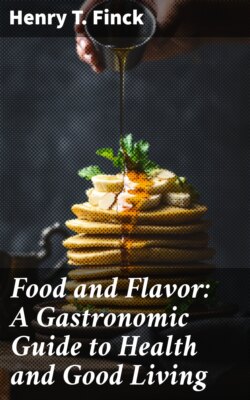Читать книгу Food and Flavor: A Gastronomic Guide to Health and Good Living - Henry T. Finck - Страница 19
На сайте Литреса книга снята с продажи.
SENSUAL INDULGENCE AS A DUTY.
ОглавлениеTable of Contents
Too long we have been allowing covetous manufacturers and dealers and incompetent or indolent cooks to spoil our naturally good food. We have done this because we have not as a nation understood that there is nothing in the world on which our health and hourly comfort, our happiness and our capacity for hard work, depend so much as on the Flavor of food—those savory qualities which make it appetizing and enjoyable and therefore digestible and helpful.
It is not too much to say that the most important problem now before the American public is to learn to enjoy the pleasures of the table and to insist on having savory food at every meal.
There was a time when it would have been considered rank heresy to express such an opinion, and even to-day there are millions of honest folk who hold that the enjoyment of a good meal is merely a form of sybaritic indulgence.
When Ruskin wrote his "Modern Painters" he referred to the indulgence of taste as an "ignoble source of pleasure." He lived to realize the foolishness of this sneer; in one of those amusing footnotes which he contributed to the final edition of that great work, and in which he often assails his own former opinions with merciless severity, he denounces the "cruelty and absurdity" of his failing to learn to appreciate the dainties provided by his father. But his earlier opinion reflected the general attitude of the time toward the pleasures of the table.
Fortunately, in our efforts to fight the great American plague—dyspepsia—we are no longer seriously hampered by that Puritan severity which caused the father of Walter Scott, when young Walter one day expressed his enjoyment of the soup, to promptly mix with it a pint of water to take the devil out of it.
America's leading educator, Ex-President Eliot of Harvard, has expressed the more rational view of our time in these words: "Sensuous pleasures, like eating and drinking, are sometimes described as animal, and therefore unworthy, but men are animals and have a right to enjoy without reproach those pleasures of animal existence which maintain health, strength, and life itself."
We may go farther than that, asserting that not only have we a right to enjoy the pleasures of the table, but it is our moral duty to do so. The highest laws of health demand of us that we get as much pleasure out of our meals as possible. To prove this statement is the main object of the present volume, nearly every page of which bears witness to its truth, directly or indirectly.
